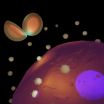(Press-News.org) An FDA-approved drug initially used to treat insulin resistance in diabetics has shown promise as a way to improve cognitive performance in some people with Alzheimer's disease.
Working with genetically engineered mice designed to serve as models for Alzheimer's, University of Texas Medical Branch at Galveston researchers found that treatment with the anti-insulin-resistance drug rosiglitazone enhanced learning and memory as well as normalized insulin resistance. The scientists believe that the drug produced the response by reducing the negative influence of Alzheimer's on the behavior of a key brain-signaling molecule.
The molecule, called extracellular signal-regulated kinase (ERK), becomes hyperactive both in the brains of Alzheimer's patients and in the mice at a disease stage corresponding to mild cognitive impairment in human Alzheimer's. This excessive activity leads to improper synaptic transmission between neurons, interfering with learning and memory.
Rosiglitazone brings ERK back into line by activating what's known as the peroxisome proliferator-activated receptor gamma (PPARγ) pathway, which interacts with genes that respond to both PPARγ and ERK.
"Using this drug appears to restore the neuronal signaling required for proper cognitive function," said UTMB professor Larry Denner, the lead author of a paper describing this work now online in the Journal of Neuroscience. "It gives us an opportunity to test several FDA-approved drugs to normalize insulin resistance in Alzheimer's patients and possibly also enhance memory, and it also gives us a remarkable tool to use in animal models to understand the molecular mechanisms that underlie cognitive issues in Alzheimer's."
ERK dysfunction in the Alzheimer's mouse model was discovered several years ago by UTMB associate professor Kelly Dineley, senior author of the Journal of Neuroscience paper. But putting together the protein, gene and memory pieces of the puzzle required a multidisciplinary translational research team including animal cognitive neuroscientists, biochemists, molecular biologists, mass spectrometrists, statisticians and bioinformaticists.
"We were extraordinarily lucky to have this diverse group of experts right here on our campus at UTMB that could coalesce to bring such different ways of thinking to bear on a common problem," Denner said. "It was quite a challenge to get all of these experts communicating in a common scientific language. But now that we have this team working, we can move on to even more detailed and difficult questions."
Now the UTMB research team and other investigators across the world are starting clinical trials to investigate the value of therapies for insulin resistance in early-stage Alzheimer's disease in humans.
###Other authors of the Journal of Neuroscience paper include predoctoral fellows Jennifer Rodriguez-Rivera and Jordan Jahrling, research associate Sigmund Haidacher, scientist Russ Carmichael, assistant professors Rovshan Sadygov, Jonathan Starkey and Heidi Spratt, and professors Bruce Luxon and Thomas Wood. This research was supported by the National Institutes of Health, the American Health Assistance Foundation, the Sealy Foundation for Biomedical Research, the Emmett and Miriam McCoy Foundation, the Cullen Trust for Health Care and Jerry and Winkie Mohn.
The University of Texas Medical Branch
Office of Public Affairs
301 University Boulevard, Suite 3.102
Galveston, Texas 77555-0144
www.utmb.edu
ABOUT UTMB HEALTH: Established in 1891, Texas' first academic health center comprises four health sciences schools, three institutes for advanced study, a research enterprise that includes one of only two national laboratories dedicated to the safe study of infectious threats to human health, and a health system offering a full range of primary and specialized medical services throughout Galveston County and the Texas Gulf Coast region. UTMB Health is a component of the University of Texas System and the Texas Medical Center.
Research shows diabetes drug improves memory
2012-11-21
ELSE PRESS RELEASES FROM THIS DATE:
UCSB anthropologist studies reciprocity among chimpanzees and bonobos
2012-11-21
(Santa Barbara, Calif.) –– When your neighbor asks to borrow a cup of sugar and you readily comply, is your positive response a function of the give and take that characterize your longstanding relationship? Or does it represent payment –– or prepayment –– for the cup of sugar you borrowed last week, or may need to borrow a month from now?
Adrian Jaeggi, a postdoctoral researcher in anthropology at UC Santa Barbara, and a junior research fellow at the campus's SAGE Center for the Study of the Mind, is studying this question of reciprocity, using chimpanzees and bonobos ...
UAlberta prostate cancer researcher and team developing 'homing beacon drugs' to target cancer cells
2012-11-21
A medical researcher with the University of Alberta and his team just published their findings about their work on developing 'homing beacon drugs' that kill only cancer cells, not healthy ones, thanks to nano-technology.
John Lewis, the Frank and Carla Sojonky Chair in Prostate Cancer Research with the Faculty of Medicine & Dentistry, published his findings in the peer-reviewed journal, Nano Letters. He is also an associate professor in the Department of Oncology, a Fellow with the National Institute for Nanotechnology at the U of A and director of the Translational Prostate ...
Algae can draw energy from other plants
2012-11-21
This press release is available in German.
Flowers need water and light to grow. Even children learn that plants use sunlight to gather energy from earth and water. Members of Professor Dr. Olaf Kruse's biological research team at Bielefeld University have made a groundbreaking discovery that one plant has another way of doing this. They have confirmed for the first time that a plant, the green alga Chlamydomonas reinhardtii, not only engages in photosynthesis, but also has an alternative source of energy: it can draw it from other plants. This finding could also have ...
Executive pay limits narrowed scope of TARP banking rescue
2012-11-21
CHESTNUT HILL, MA (Nov. 20, 2012) – The executive pay provisions of the TARP – the Troubled Asset Relief Program – stoked controversy. Bankers claimed the rules would thwart their efforts to attract and retain the best executives. But the pay rules may have had an unintended benefit of reducing the scope of the program, researchers say.
A newly published report in the Journal of Banking, Finance & Accounting finds that pay provisions did discourage some banks from participating in TARP, which was intended to help banks weather the 2008-2009 financial crisis, according ...
Seals gamble with their pups' futures
2012-11-21
Some grey seal mums adopt risky tactics when it comes to the future of their young, a strategy that can give their pup a real advantage, according to scientists.
Researchers from Durham University, UK, and the University of St Andrews, looking at grey seal colonies in Scotland, found that some seal mothers are flexible in the parenting style they adopt and 'gamble' on the outcome of their actions, whilst other play it safe and steady.
The study is the first to demonstrate how variation in personality traits in large marine mammals in the wild can persist, rather than ...
New American Chemical Society video series shines a light on transparent solar cells
2012-11-21
WASHINGTON, Nov. 20, 2012 — The American Chemical Society (ACS) today launched a new video series that highlights headline-making research from the society's suite of more than 40 peer-reviewed scientific journals. The first episode of Breakthrough Science focuses on research reported in one of those journals, ACS Nano. It involved development of new transparent solar cells, an advance toward giving windows in homes and other buildings the ability to generate electricity while still allowing people to see outside.
The video is available at http://pubs.acs.org/page/videos/breakthroughscience.html.
Breakthrough ...
Researchers find decline in availability and use of key treatment for depression
2012-11-21
Providence, RI - - Electroconvulsive therapy (ECT) is considered the most effective treatment option for patients with severe depression who cannot find symptom relief through antidepressant medications or psychotherapy. In a new study, researchers at Butler Hospital and Bradley Hospital in Rhode Island found a sharp decline in the availability and use of ECT in general hospitals across the U.S. The findings were published online in the journal Biological Psychiatry on October 10, 2012.
The researchers analyzed data from a nationally representative survey of US general ...
New method helps target Parkinson's disease
2012-11-21
Health professionals may soon have a new method of diagnosing Parkinson's disease, one that is noninvasive and inexpensive, and, in early testing, has proved to be effective more than 90 percent of the time.
In addition, this new method has the potential to track the progression of Parkinson's, as well as measure the effectiveness of treatments for the disorder, said Rahul Shrivastav, professor and chairperson of Michigan State University's Department of Communicative Sciences and Disorders and a member of the team developing the new method.
It involves monitoring a ...
Tiny probes shine brightly to reveal the location of targeted tissues
2012-11-21
Called BRIGHTs, the tiny probes described in the online issue of Advanced Materials on Nov. 15, bind to biomarkers of disease and, when swept by an infrared laser, light up to reveal their location.
Tiny as they are, the probes are exquisitely engineered objects: gold nanoparticles covered with molecules called Raman reporters, in turn covered by a thin shell of gold that spontaneously forms a dodecahedron.
The Raman reporters are molecules whose jiggling atoms respond to a probe laser by scattering light at characteristic wavelengths.
The shell and core create an ...
IUDs don't cause pelvic inflammatory disease in women
2012-11-21
The risk of developing pelvic inflammatory disease (PID) following insertion of an intrauterine device (IUD) is very low, whether or not women have been screened beforehand for gonorrhea and chlamydia, according to a joint study of nearly 60,000 women by researchers at the University of California, San Francisco (UCSF), and Kaiser Permanente Northern California Division of Research.
The study appears this week in the current online issue of Obstetrics & Gynecology, the official journal of the American College of Obstetricians and Gynecologists, also known as Green Journal.
The ...



